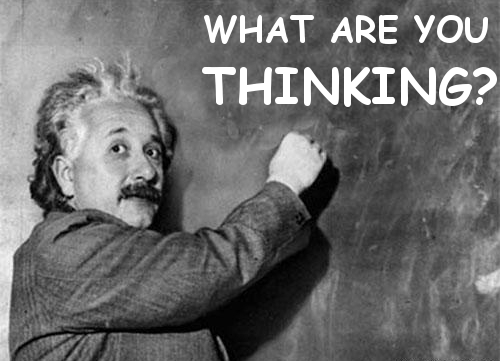How do you think in Math?

Although I don't have a very long history in math, I have come to notice that the way one thinks can greatly affect his or her potential abilities. To elaborate, here's two examples of what I mean by the 'way one thinks'. A person who thinks pragmatically and simply makes observations and applies them, will most likely be able to efficiently provide a realistic solution to the matter at hand. But that person's ability to discover will be limited, as it is very probable that his curiosity will not go far enough for the person to willingly research a field with great depth. On the other hand, a person with an inquisitive nature would find it enjoyable to work his or her way around logic to reach an amazing theory which could explain much of what was questioned. Only that, it might prove hard for this type of individual to solve problems with very long methods of solution as computing all of which needs to be done from the fundamentals is a difficult task. Now, these are merely two examples of many different thought processes that are used when faced with a question. Returning to the question in the title of this discussion, is there a specialized way of thinking that has a greater potential of unraveling answers to problems? If so, what would it be?
Easy Math Editor
This discussion board is a place to discuss our Daily Challenges and the math and science related to those challenges. Explanations are more than just a solution — they should explain the steps and thinking strategies that you used to obtain the solution. Comments should further the discussion of math and science.
When posting on Brilliant:
*italics*or_italics_**bold**or__bold__paragraph 1
paragraph 2
[example link](https://brilliant.org)> This is a quote# I indented these lines # 4 spaces, and now they show # up as a code block. print "hello world"\(...\)or\[...\]to ensure proper formatting.2 \times 32^{34}a_{i-1}\frac{2}{3}\sqrt{2}\sum_{i=1}^3\sin \theta\boxed{123}Comments
The first is better for engineers, and mostly better for experimentalists. The second is somewhat better for theoretical scientists.
Log in to reply
Agree
and some random people.. i guess
I personally believe that the second method is more beneficial..what are your views on it?
Log in to reply
I also think that the 2nd method wins in the long run but there is also need for the 1st type of people!!!Pure research today is applied research tomorrow.
Well, that was how I thought at first, but a certain person told me that I needed to know how to contain my curiosity as it'd take me a really long time trying to derive formulas and such since it took the ancient mathematicians very long as well.
Log in to reply
But i think it is useful in long term, rather than just finding the solution it is important to know the approach behind it.
in my opinion the 2nd method is more beneficial.
2nd method
I don't consider myself very good at giving opinions but I would say that the two methods you defined above are purely abstract.They seem as you perceive them. I can prove my point as follows; a person who practices the former, will be more realistic,analytical,methodical,good at observing minutely, a keen observer because he will love facts more than skills,will have remarkable ability to analyse a great deal of data because his love for facts will make his intuitive brain tilt towards the very important and ignore the rest. While a person who practices the latter will be inquisitive,will not be contented with the facts , unlike the former he will analyse the whole data and his way of problem solving will be admired not because he knows that thing but because his way of putting will reveal all the hidden facts.This kind of attitude is not easy to develop because it requires hard perseverance and if acquired it makes you more than what you actually desired but at that point that knowledge will not content you and then it wont be for just for the sake of knowledge, it will transform into eternal joy. Always remember; When the apple fell on Newton's head it took him 20 years to discover Law of gravitation and the work of those 20 years was what we call calculus. (I hope that helps)